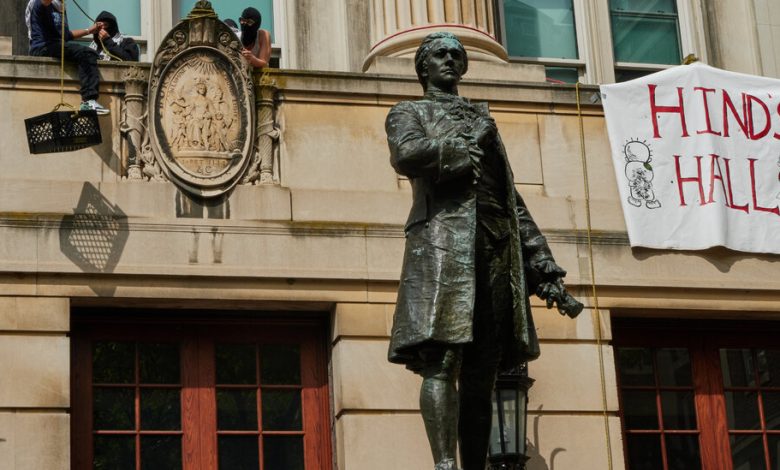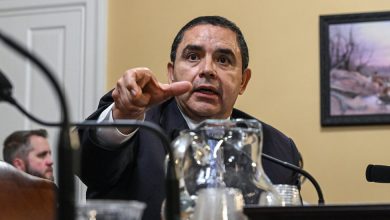Taking Cues From Students, U.C.L.A. Faculty Members Join the Protests

Earlier this week, some faculty members at the University of California, Los Angeles, had an emergency call with students who were active in the pro-Palestinian protests.
“We just got a really clear message from them: ‘We feel unsafe, and we’d like your help in fixing this,” recalled Graeme Blair, an associate professor of political science.
In that moment, several dozen faculty activists volunteered to join the students in shifts around the clock at their encampment on campus.
And in the dark hours of Thursday morning, as the police cracked down on the protests, those faculty members were linking arms with students, allowing themselves to be arrested.
It was one of the clearest instances of a little-noted fact of the student demonstrations against the war in Gaza — that a small fraction of faculty members at U.C.L.A., Columbia and other universities have provided logistical and emotional support to the protesters.
Some faculty members have formal ties to Faculty and Staff for Justice in Palestine, the counterpart of Students for Justice in Palestine, a decentralized national network of pro-Palestinian groups.
Others are not necessarily sympathetic to the Palestinian cause but see a moral obligation to protect the free speech and the welfare of their students, who are facing some of the biggest disruptions to their educational lives since the pandemic.
“It’s a breach of trust that they would call the police on our students,” said Stephanie McCurry, a history professor at Columbia University, who watched over the perimeter of the encampment before the last police sweep on Wednesday.
The issue has torn apart the faculties at these universities. More than a few say the activist professors are romanticizing the demonstrations, which have thrown campuses into chaos.
“It’s a sad way to end the semester,” said James Applegate, an astronomy professor at Columbia University.
At Columbia, some faculty members had shown their support for the students — if not necessarily for their message — by visiting the encampment before it was swept away by the police on Wednesday morning. They delivered food and water, incorporated the protests into their academic lessons, participated in panel discussions and stood guard outside the perimeter to make it harder for the authorities to evict the students.
The faculty members did not necessarily agree with the views of the students on Gaza, said Camille Robcis, a history professor at Columbia. But, she said, “I believe in their right to protest more than anything.”
Over the last few chaotic days, they had communicated with one another through Listservs and on the encrypted Signal app, signing up for time slots to appear on campus.
In a counterweight, pro-Israel faculty members and students formed their own WhatsApp and email support groups.
“Those have been really helpful,” said Carol Ewing Garber, a professor of applied physiology at Teachers College, an affiliate of Columbia. “They actually brought people together who had never met before. It was a silver lining.”
Bruce Robbins, an English professor at Columbia, is among those who are more devoted to the Palestinian cause, a member of Columbia’s chapter of Faculty and Staff for Justice in Palestine.
He brought one of his classes to the tents as part of a course studying atrocities.
“It was one of the things that faculty who supported the encampment did,” he said, “was take their classes inside the encampment.”
Two of his students, who he believes were former members of the Israeli military, did not show up for that lesson.
“I was planning on making it as comfortable as I could,” he said. “But I think the feeling in the class was not running in their favor, and that may be why they didn’t show up.”
At one point, students asked the faculty members to help protect them, Dr. Robbins said. “We were described as ‘de-escalators.’”
Several faculty members put on orange safety vests, he said, and got “a quick training on how not to get into a fight — if they push past us, let them push past us.”
“I played football,” he said. “It was not my instinct to de-escalate. But that’s what I was there to do.”
Dr. Applegate, the astronomy professor, thought the faculty’s participation in the campus protests was part of a romanticization of the Vietnam-era antiwar protests.
“These guys are trying to relive 1968,” he said, referring to a violent confrontation with the police that shook Columbia back then. “I don’t think they have any intention of having a sensible conversation with anybody.”
At U.C.L.A., members of Faculty for Justice in Palestine helped negotiate with the administration, Dr. Blair said.
The faculty members even hired a professional to train them in de-escalating physical or verbal conflict, he said, “with the idea that the faculty could help play this role.”
Dr. Blair also called on his sister, Susannah Blair, an adjunct lecturer in art history at Columbia, to share her experience with about 75 U.C.L.A. faculty members. On Zoom, she told them how most of her students were hungry to talk about what they were going through, even though they came from different backgrounds and experienced things differently.
“Their libraries are closed right now,” she said in an interview. “It’s finals. They have had friends arrested. Some of them have been protesting against a genocide, and this has deeply disrupted all sorts of aspects of their lives.”
The crisis at U.C.L.A. reached a climax on Thursday morning.
Protesters learned that the administration was going to shut down their encampment, Dr. Blair said.
“The faculty was there to try to be the first people arrested, to stand in front of the students to bear witness,” he said. “We watched from that vantage as the California Highway Patrol aimed weapons that were using nonlethal ammunition. We basically pleaded with them to not aim their weapons at our students, at what was an entirely peaceful protest.”
Ultimately, about 200 protesters were arrested, along with about 10 faculty members, Dr. Blair said. Many were lecturers and assistant professors, without the protections of tenure, he said, adding, “It remains to be seen what the consequences will be.”
Stephanie Saul contributed reporting. Susan C. Beachy and Kirsten Noyes contributed research.



